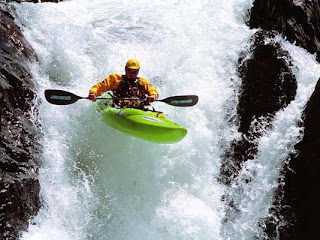 |
| BASE jumper prepares to launch from Christ the Redeemer in Rio de Janeiro |
Unfortunately, like many athletes and adventurers, Jill Kuzman did not have health insurance coverage at the time of the incident and quickly racked up $120,000 in medical bills. Friends pitched in and Kuzman herself reached out on Facebook for donations to help offset her cost, bringing in close to $10,000 toward her bills, but a majority of her expenses still remain.
Not long after Kuzman's incident something of a firestorm, focused on uninsured BASE jumpers and adventure seekers, erupted on BASEjumper.com, with some contributors voicing support, others exasperation that someone would engage in such high risk activities uninsured, when accidents are so likely to occur. In his article The Adventurer's Health Insurance Conundrum on National Geographic's Adventure Blog, James Mills outlines the argument that unfolded on the site and examines some of the points that were brought to light, which adventure-seekers across a number of sports must grapple with.
Though Jill Kuzman was not specifically named, Mills points out that many involved in the online exchange felt that she was the unnamed reason for the outpouring of frustration. In her defense, James Mills states, "to her credit Kuzman made a good faith effort to acquire health insurance. Unfortunately as a single payer with three pre-existing conditions, including seasonal allergies, the cost was prohibitively expensive."
 |
| Some activities, such as kayaking waterfalls, carry more risk than many insurance companies may want to take on |
James Mills concludes his in-depth article by musing on President Obama's Affordable Health Care Act, which takes effect in 2014. The Act will require everyone in the United States, with the exception of those in poverty and religious objectors, to purchase health care or face a fine. The speculation that produced the bill surmises that, as Mills puts it, "With a much deeper pool of potential policy holders the understanding is that premium costs will go down as market competition rises. But it remains to be seen."
 |
| As you push the envelope, your health insurance company may push back - with increased rates or loss of coverage |
Mills closes his article astutely: "Even though she [Kuzman] did everything right at the time of her accident shouldn’t the final check of her BASE rig have been up to date medical coverage? Or should a broken and dysfunctional healthcare system be allowed to stifle the creative expression of flight and freedom at the core of the sport? For now it’s up to each individual to decide for themselves."
No comments:
Post a Comment